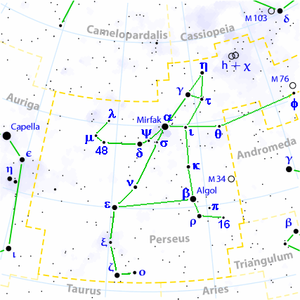
Pi Persei
Encyclopedia

Star
A star is a massive, luminous sphere of plasma held together by gravity. At the end of its lifetime, a star can also contain a proportion of degenerate matter. The nearest star to Earth is the Sun, which is the source of most of the energy on Earth...
in the constellation
Constellation
In modern astronomy, a constellation is an internationally defined area of the celestial sphere. These areas are grouped around asterisms, patterns formed by prominent stars within apparent proximity to one another on Earth's night sky....
Perseus
Perseus (constellation)
Perseus is a constellation in the northern sky, named after the Greek hero Perseus. It was one of the 48 constellations listed by the 2nd century astronomer Ptolemy, and remains one of the 88 modern constellations defined by the International Astronomical Union...
. It also has the traditional name Gorgonea Secunda.
Pi Persei has an apparent magnitude
Apparent magnitude
The apparent magnitude of a celestial body is a measure of its brightness as seen by an observer on Earth, adjusted to the value it would have in the absence of the atmosphere...
of +4.7 and spectral class
Stellar classification
In astronomy, stellar classification is a classification of stars based on their spectral characteristics. The spectral class of a star is a designated class of a star describing the ionization of its chromosphere, what atomic excitations are most prominent in the light, giving an objective measure...
A2V. The star is about 362 light years from Earth.
In Chinese astronomy
Chinese astronomy
Astronomy in China has a very long history, with historians considering that "they [the Chinese] were the most persistent and accurate observers of celestial phenomena anywhere in the world before the Arabs."...
, Gorgonea Secunda is called 積屍, Pinyin
Pinyin
Pinyin is the official system to transcribe Chinese characters into the Roman alphabet in China, Malaysia, Singapore and Taiwan. It is also often used to teach Mandarin Chinese and spell Chinese names in foreign publications and used as an input method to enter Chinese characters into...
: Jīshī, meaning Heap of Corpses, because this star is marking itself and stand alone in Heap of Corpses asterism, Stomach
Stomach (Chinese constellation)
The Stomach mansion is one of the Twenty-eight mansions of the Chinese constellations. It is one of the western mansions of the White Tiger.-Asterisms:...
mansion (see : Chinese constellation
Chinese constellation
Chinese constellations are the way the ancient Chinese grouped the stars. They are very different from the modern IAU recognized constellations. This is because the IAU was based on Greco-Roman astronomy instead of Chinese astronomy....
).. 積屍 (Jīshī), westernized into Tseih She, but the name Tseih She was designated for β Per (Algol) by R.H. Allen and the meaning is "the Piled-up Corpses"

